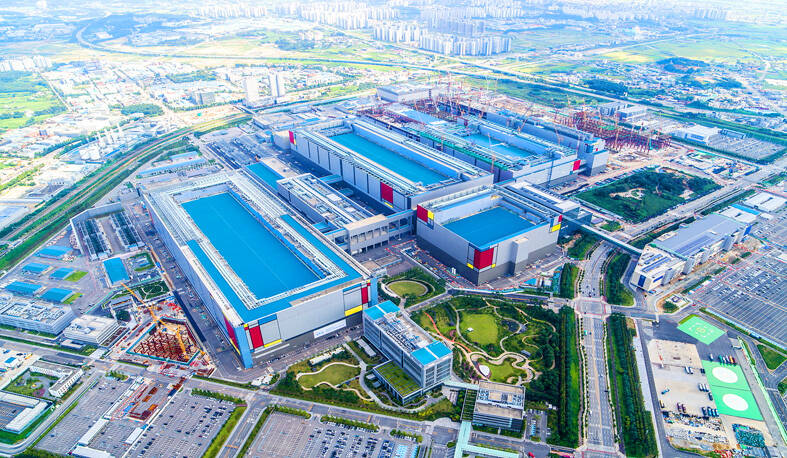The South Korean Ministry of Trade, Industry and Energy yesterday said that Washington’s proposed rules to prevent US$52 billion in chip funding from being used by “countries of concern” would not force recipients to shut down their factories in China.
The US Department of Commerce on Tuesday proposed limits for recipients of US chip manufacturing and research funding, including limits on investing in expansion in countries such as China and Russia.
The world’s largest and second-largest memorychip makers, Samsung Electronics Co and SK Hynix Inc, have chip production facilities in China.

Photo: REUTERS
Samsung is building a chip plant in Texas that could cost more than US$25 billion, while SK Hynix parent SK Group last year announced plans to invest US$15 billion in the US chip industry. Both might apply for funding.
The proposed rules for funding recipients limit chip production capacity growth in China to 5 percent over 10 years as measured by wafers, and 10 percent for older legacy chips, the South Korean trade ministry said.
They do not restrict investments in technology and process upgrades, or equipment replacement necessary for the operation of existing facilities, the ministry added.
“For production facilities our companies are operating in China, it is expected that maintenance and partial expansion as well as technology upgrades will continue to be possible,” the ministry said in a statement.
“As technology is upgraded, chips per wafer can be increased ... which could further expand production depending on corporate strategies,” it added.
The South Korean government is planning to communicate with the local industry, analyze proposed rules and consult with US counterparts within 60 days, the ministry said.
Uncertainty includes what happens when the one-year waiver for Samsung and SK Hynix to receive chip equipment needed in China expires in October, said an industry source, who declined to be named because of the sensitivity of the matter.
Samsung and SK Hynix said they would review the details of the announcement.
Taiwan Semiconductor Manufacturing Co (台積電), the world’s largest contract chipmaker, which is investing US$40 billion in a new chip plant in Arizona and also manufactures in China, declined to comment on Washington’s announcement.
The ministry said that Samsung’s plan to invest US$230 billion in South Korea over 20 years to develop a large chipmaking base was in line with uncertainties in investing in China or the US.

To many, Tatu City on the outskirts of Nairobi looks like a success. The first city entirely built by a private company to be operational in east Africa, with about 25,000 people living and working there, it accounts for about two-thirds of all foreign investment in Kenya. Its low-tax status has attracted more than 100 businesses including Heineken, coffee brand Dormans, and the biggest call-center and cold-chain transport firms in the region. However, to some local politicians, Tatu City has looked more like a target for extortion. A parade of governors have demanded land worth millions of dollars in exchange

Hong Kong authorities ramped up sales of the local dollar as the greenback’s slide threatened the foreign-exchange peg. The Hong Kong Monetary Authority (HKMA) sold a record HK$60.5 billion (US$7.8 billion) of the city’s currency, according to an alert sent on its Bloomberg page yesterday in Asia, after it tested the upper end of its trading band. That added to the HK$56.1 billion of sales versus the greenback since Friday. The rapid intervention signals efforts from the city’s authorities to limit the local currency’s moves within its HK$7.75 to HK$7.85 per US dollar trading band. Heavy sales of the local dollar by

Taiwan Semiconductor Manufacturing Co’s (TSMC, 台積電) revenue jumped 48 percent last month, underscoring how electronics firms scrambled to acquire essential components before global tariffs took effect. The main chipmaker for Apple Inc and Nvidia Corp reported monthly sales of NT$349.6 billion (US$11.6 billion). That compares with the average analysts’ estimate for a 38 percent rise in second-quarter revenue. US President Donald Trump’s trade war is prompting economists to retool GDP forecasts worldwide, casting doubt over the outlook for everything from iPhone demand to computing and datacenter construction. However, TSMC — a barometer for global tech spending given its central role in the

An Indonesian animated movie is smashing regional box office records and could be set for wider success as it prepares to open beyond the Southeast Asian archipelago’s silver screens. Jumbo — a film based on the adventures of main character, Don, a large orphaned Indonesian boy facing bullying at school — last month became the highest-grossing Southeast Asian animated film, raking in more than US$8 million. Released at the end of March to coincide with the Eid holidays after the Islamic fasting month of Ramadan, the movie has hit 8 million ticket sales, the third-highest in Indonesian cinema history, Film